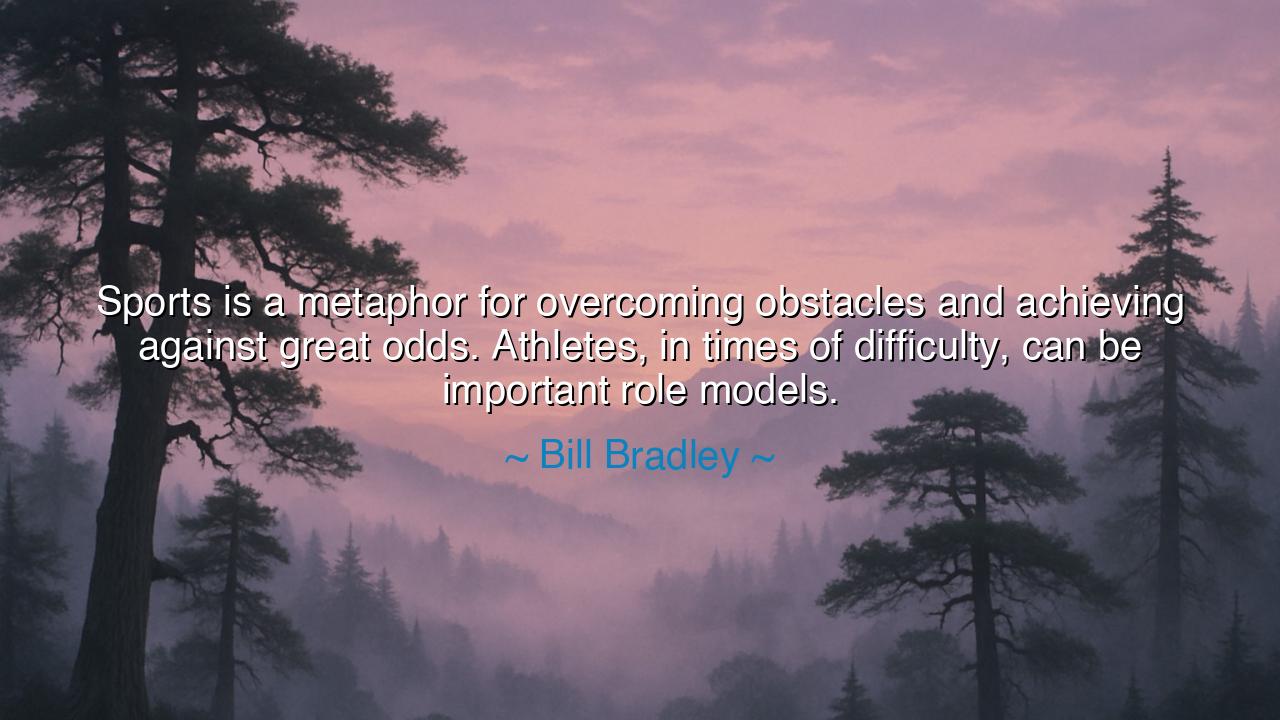
Sports is a metaphor for overcoming obstacles and achieving
Sports is a metaphor for overcoming obstacles and achieving against great odds. Athletes, in times of difficulty, can be important role models.






When Bill Bradley declared, “Sports is a metaphor for overcoming obstacles and achieving against great odds. Athletes, in times of difficulty, can be important role models,” he was not speaking only of games or victories, but of the very essence of the human struggle. For in the sweat of the athlete, in the clash of the contest, in the rise after defeat, we see reflected the eternal condition of mankind—always striving, always facing resistance, always daring to conquer what seems unconquerable.
The ancients understood this truth well. In Greece, the Olympic Games were not idle amusements but sacred rituals, meant to show how discipline, courage, and resilience could bring glory to both the victor and the city he represented. The javelin, the sprint, the wrestle—these were not mere physical feats, but metaphors for life’s endless battles. Bradley’s words are an echo of this ancient wisdom: that sport is never only about the score, but about the model it provides for enduring hardship, rising again, and showing others that even in darkness, triumph is possible.
When he speaks of “overcoming obstacles and achieving against great odds,” Bradley names the very heartbeat of the human story. Every person, whether athlete or not, faces barriers—poverty, injustice, illness, failure, or despair. Yet when we see an athlete stumble, fall, and still rise to claim victory, we are reminded of what is possible for us. The contest of sport becomes a living parable, written not with words but with sweat and sacrifice.
Consider the story of Jesse Owens at the 1936 Berlin Olympics. Against the backdrop of tyranny, racism, and propaganda, Owens won four gold medals, shattering Hitler’s vision of Aryan supremacy. His achievements went beyond sport; they became a symbol of dignity, courage, and the triumph of the human spirit over hate. Here, Bradley’s teaching is made flesh: the athlete, by enduring and excelling under immense pressure, becomes a role model for the world.
But Bradley’s words also remind us that athletes’ value is not only in their victories, but in their perseverance. The runner who finishes last but never quits, the boxer who rises after being struck down, the player who loses with grace—all of these teach lessons as profound as the champion’s crown. Role models are not those who win without struggle, but those who struggle and show us how to endure.
The lesson, then, is clear: look to sports not merely for entertainment, but for wisdom. See in the athlete a reflection of your own battles. Let their courage fuel yours, let their resilience inspire yours. For just as they face odds on the field, so too must you face odds in life. Their victories are not theirs alone—they are gifts, given to all who watch, reminders that greatness is possible in every human heart.
Practically, this means seeking out role models not only in the halls of power or the pages of books, but also on the courts, the tracks, the fields. Watch how they train, how they rise, how they endure. Then, carry those lessons into your own struggles. Ask yourself: what obstacle must I overcome? What odds must I face? And remember, as Bradley teaches, that every challenge is an opportunity to show your own resilience, your own strength, your own humanity.
Thus, Bill Bradley’s words endure as a teaching for all ages: sports is not only play, but metaphor; athletes are not only competitors, but teachers. They remind us that life is a contest, that obstacles are the proving ground of the soul, and that by enduring with courage, each of us can achieve against great odds. And in this striving, we ourselves become the role models for those who will follow after us.






AAdministratorAdministrator
Welcome, honored guests. Please leave a comment, we will respond soon